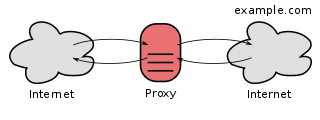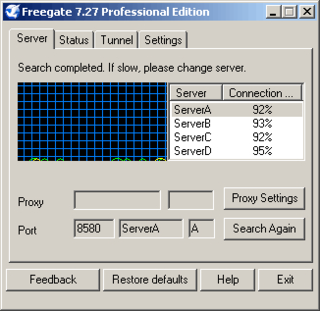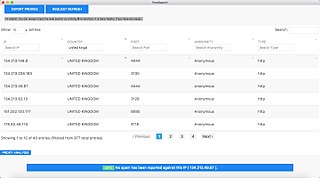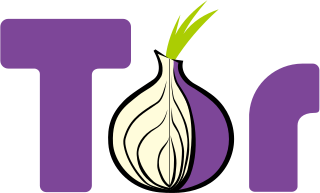Related Research Articles

In computer networking, a proxy server is a server application that acts as an intermediary between a client requesting a resource and the server providing that resource.
An anonymous P2P communication system is a peer-to-peer distributed application in which the nodes, which are used to share resources, or participants are anonymous or pseudonymous. Anonymity of participants is usually achieved by special routing overlay networks that hide the physical location of each node from other participants.

An open proxy is a type of proxy server that is accessible by any Internet user.

Internet security is a branch of computer security. It encompasses the Internet, browser security, web site security, and network security as it applies to other applications or operating systems as a whole. Its objective is to establish rules and measures to use against attacks over the Internet. The Internet is an inherently insecure channel for information exchange, with high risk of intrusion or fraud, such as phishing, online viruses, trojans, ransomware and worms.
A dark net or darknet is an overlay network within the Internet that can only be accessed with specific software, configurations, or authorization, and often uses a unique customized communication protocol. Two typical darknet types are social networks, and anonymity proxy networks such as Tor via an anonymized series of connections.
Internet privacy involves the right or mandate of personal privacy concerning the storing, re-purposing, provision to third parties, and displaying of information pertaining to oneself via Internet. Internet privacy is a subset of data privacy. Privacy concerns have been articulated from the beginnings of large-scale computer sharing and especially relate to mass surveillance enabled by the emergence of computer technologies.
Secure communication is when two entities are communicating and do not want a third party to listen in. For this to be the case, the entities need to communicate in a way that is unsusceptible to eavesdropping or interception. Secure communication includes means by which people can share information with varying degrees of certainty that third parties cannot intercept what is said. Other than spoken face-to-face communication with no possible eavesdropper, it is probably safe to say that no communication is guaranteed to be secure in this sense, although practical obstacles such as legislation, resources, technical issues, and the sheer volume of communication serve to limit surveillance.
An anonymous post, is an entry on a textboard, anonymous bulletin board system, or other discussion forums like Internet forum, without a screen name or more commonly by using a non-identifiable pseudonym. Some online forums such as Slashdot do not allow such posts, requiring users to be registered either under their real name or utilizing a pseudonym. Others like JuicyCampus, AutoAdmit, 2channel, and other Futaba-based imageboards thrive on anonymity. Users of 4chan, in particular, interact in an anonymous and ephemeral environment that facilitates rapid generation of new trends.

Freegate is a software application developed by Dynamic Internet Technology (DIT) that enables internet users from mainland China, South Korea, North Korea, Syria, Vietnam, Iran, United Arab Emirates, Germany, New Zealand, Australia, and the United Kingdom among others, to view websites blocked by their governments. The program takes advantage of a range of proxy servers called Dynaweb. This allows users to bypass Internet firewalls that block web sites by using DIT's Peer-to-peer (P2P)-like proxy network system. FreeGate's anti-censorship capability is further enhanced by a new, unique encryption and compression algorithm in the versions of 6.33 and above. Dynamic Internet Technology estimates Freegate had 200,000 users in 2004. The maintainer and CEO of DIT is Bill Xia.

A proxy list is a list of open HTTP/HTTPS/SOCKS proxy servers all on one website. Proxies allow users to make indirect network connections to other computer network services. Proxy lists include the IP addresses of computers hosting open proxy servers, meaning that these proxy servers are available to anyone on the internet. Proxy lists are often organized by the various proxy protocols the servers use. Many proxy lists index Web proxies, which can be used without changing browser settings.
An anonymizer or an anonymous proxy is a tool that attempts to make activity on the Internet untraceable. It is a proxy server computer that acts as an intermediary and privacy shield between a client computer and the rest of the Internet. It accesses the Internet on the user's behalf, protecting personal information of the user by hiding the client computer's identifying information. Anonymous proxy is the opposite of transparent proxy, which sends user information in the connection request header.

Tor, short for "The Onion Router," is free and open-source software for enabling anonymous communication. It directs Internet traffic via a free, worldwide, volunteer overlay network that consists of more than seven thousand relays.
Ntrepid is an American software, hardware, and cyber security company, registered in Florida and based in Herndon, Virginia.

UltraSurf is a freeware Internet censorship circumvention product created by UltraReach Internet Corporation. The software bypasses Internet censorship and firewalls using an HTTP proxy server, and employs encryption protocols for privacy.
Internet censorship circumvention is the use of various methods and tools to bypass internet censorship.
Hotspot Shield is a public VPN service operated by AnchorFree, Inc. Hotspot Shield was used to bypass government censorship during the Arab Spring protests in Egypt, Tunisia, and Libya.

Lantern is a free internet censorship circumvention tool that operates in some of the most extreme censorship environments, such as China, Iran, and Russia. It uses wide variety of protocols and techniques that obfuscate network traffic and/or co-mingle traffic with protocols censors are reluctant to block. It also uses domain fronting. It is not an anonymity tool like Tor.

IPVanish VPN is a VPN service based in the United States, with applications for Microsoft Windows, macOS, Android, iOS, and Fire TV. Manual configuration is available for ChromeOS, Windows Phone, Linux, and DD-WRT routers.

HMA is a VPN service founded in 2005 in the United Kingdom. It has been a subsidiary of the Czech cybersecurity company Avast since 2016.
A virtual private network (VPN) service provides a proxy server to help users bypass Internet censorship such as geoblocking and users who want to protect their communications against data profiling or MitM attacks on hostile networks.
References
- 1 2 Sean Marciniak. "Web Privacy Services Complicate Work of Federal Investigators". The Wall Street Journal. Retrieved 25 January 2014.
- ↑ Linzie Janis. "Fighting for free speech on the Net". International CNN. Retrieved 25 January 2013.
- ↑ Max Hall. "Location, Location, Location ..." Computer World. Retrieved 25 January 2014.
- ↑ "Infonex Internet, Inc". Wysk. Archived from the original on 1 February 2014. Retrieved 25 January 2014.
- ↑ Erez Zukerman. "Anonymizer Universal Shields You From Content-Targeting". PCWorld. Retrieved 25 January 2014.
- ↑ Lisa Guernsey. "Secrecy for All, as Encryption Goes to Market". The New York Times. Retrieved 25 January 2014.
- 1 2 Larry Greenemeier. "Identity-Crisis Prevention". Information Week. Retrieved 25 January 2014.
- ↑ Jeri Clausing. "Want More Online Privacy? Join the Crowd". The New York Times. Retrieved 25 January 2014.
- ↑ Anne Saita. "IP cloaking becoming a business necessity". Search Security. Retrieved 25 January 2014.
- ↑ Peter H. Lewis. "State of the Art; Internet Hide And Seek". The New York Times. Retrieved 25 January 2014.
- ↑ Lee Dembart. "the end user / A voice for the consumer: Private I(dentity)". The New York Times. Retrieved 25 January 2014.
- ↑ Susan Stellin. "Terror's Confounding Online Trail". The New York Times. Retrieved 25 January 2014.
- ↑ "50 Most Incredibly Useful Sites". Yahoo! Internet Life Magazine. Archived from the original on 26 January 2014. Retrieved 25 January 2014.
- ↑ "Surf the Web Safely and Anonymously". Notebook Review. Retrieved 25 January 2014.
- ↑ "StealthSurfer III". Mobile Tech Review. Archived from the original on 16 August 2012. Retrieved 25 January 2014.
- ↑ "StealthSurfer II". JusTech'n. Retrieved 25 January 2014.
- ↑ Lauren Simonds. "Remain Anonymous". Small Business Computing. Retrieved 25 January 2014.
- ↑ "PC World - Anonymizer Takes on China's Net Censors". Archived from the original on 18 August 2007. Retrieved 2007-08-03.
- ↑ Jennifer Lee. "Punching Holes In Internet Walls". The New York Times. Retrieved 25 January 2014.
- ↑ Violet Blue. "Examining the ties between TrapWire, Abraxas and Anonymizer". ZD Net. Retrieved 25 January 2014.
- 1 2 "Anonymous Government contractor has weaponized social media". The Tech Herald. Retrieved 25 January 2014.
- ↑ "Agreement and Plan of Merger". Securities and Exchange Commission. Retrieved 25 January 2014.
- ↑ "Ntrepid Corporation Issued Patent for Online Identity Protection System". PRWeb. Retrieved 25 January 2014.
- ↑ "Anonymous Surfing: What The Benefits And Issues Of Making Yourself Invisible Online?". Master New Media. Retrieved 25 January 2014.